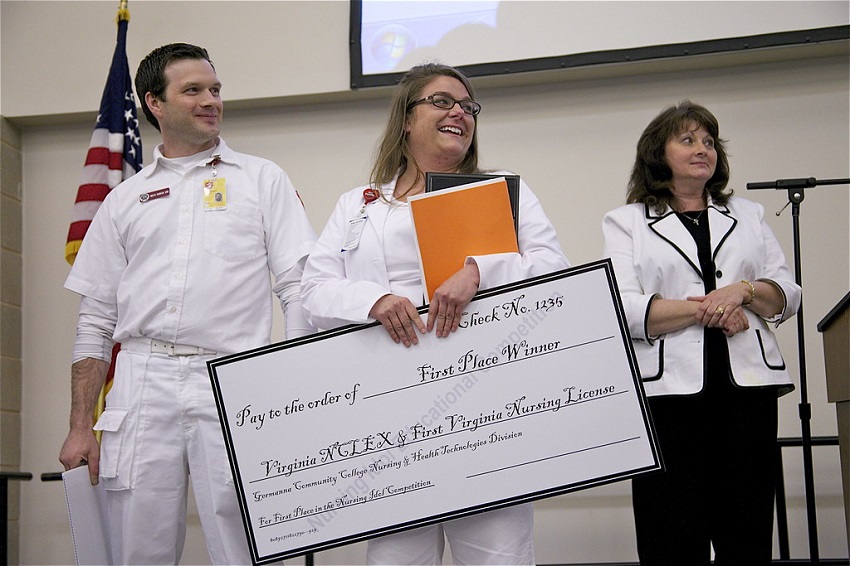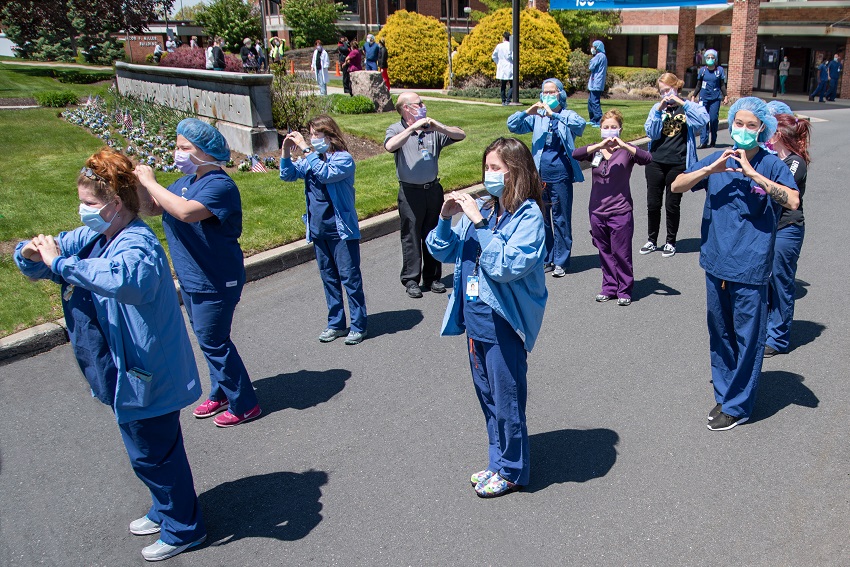There are very few careers that are far more like a vocational way of life than merely a job, and a career as a professional, registered, and practicing nurse is absolutely one of them.
That is not to say, however, that a career as a registered nurse is not without its challenges; in fact, it’s quite the opposite, and after the turbulence and intense amounts of stress placed on every single nurse since the beginning of the worldwide coronavirus pandemic, it has certainly been an extremely trying time to be a nurse for the past two years.
So, whether you are interested in becoming a nurse yourself, or rather it is another member of your family who wants to pursue a career in healthcare and nursing, you have certainly come to the right place for guidance. Here, for your information and inspiration, is a thorough, step-by-step guide to a career as a professional registered nurse.
Think About Your Personal Reasons for Becoming a Nurse
Before you embark on the pursuit of any career, it is always exceedingly helpful to ascertain your reasons for committing your professional working life to that particular area.
With nursing, however, due to the intense and often extremely challenging nature of the working life you will be living on a daily basis, it is even more important to analyze the reasons why you want to become a professional nurse.
Obviously, every single registered nurse’s motivations for becoming such vary greatly; however, there are certainly some common themes and emotions surrounding their decision. Typical reasons and causes for pursuing a professional career as a registered nurse include, but are not limited to, the following:
- To become part of a time-honored and intensely respected professional body
- To be fulfilled each and every day of your working life
- To work with a wide range of different people from a myriad of different backgrounds
- To improve your salary and career prospects
- To access opportunities otherwise inaccessible
- To make a real difference in people’s lives
- To have an exciting, challenging, and diverse career journey
As with other career choices, a certain set of skills, personality attributes, and attitudes are important in a person who is considering venturing off on a career as a nurse. Such traits include, amongst others, empathy, compassion, strong communication skills, time management, organization, and excellent interpersonal skills.
Academic Qualifications

In the United States, there are five distinctively different types of nursing degrees available to those who are dedicated to and decided on a career as a professional registered nurse:
- Nursing diplomas, which are acquired through vocational schools and community colleges
- Bachelor of Science in Nursing undergraduate degrees awarded by universities
- Associate degrees in nursing obtained through community colleges
- Master of Science in Nursing postgraduate degrees attained through a university
- Doctoral degrees in nursing or nursing specialisms obtained through universities
When deciding the particular route you would like to take on your journey to becoming a professional, practicing, and registered nurse, you should ask yourself how you intend to fit your studies around your lifestyle.
One of the best and most beneficial ways to proceed is to obtain a DNP in nursing, which will ensure you are at the top of the proverbial tree when it comes to professional opportunities and career progression.
There are numerous fantastic reasons to get a DNP in nursing, including, but in no way limited to, the following:
- To be exceedingly well prepared when it comes to leadership in healthcare settings
- You will be referred to as ‘Doctor’ (irrelevant to some yet important to a great deal)
- To show your unwavering commitment to your particular discipline and practice
- To join the thriving and immensely supportive DNP community
- To expand your knowledge of your chosen nursing specialism even further
- To increase your job prospects and enjoy exciting, higher-paid career paths
Obtaining Your License

After your initial education is complete, you will at some point be legally required to get your official registered nursing license, whether you’re at your undergraduate level and jumping straight into nursing, or committing to your academic progression within the field of nursing all the way to the invaluable DNP.
Taking the nursing license exam is often a stressful task for nurses, particularly if they have opted to sit their exam whilst still coming to the end of their nursing training. In the United States, as in the United Kingdom and a plethora of other countries, it is simply illegal for a nurse to practice without holding a license. Furthermore, different nursing positions naturally demand very different levels of intensity in terms of the exam they sit and the subsequent license they are granted.
Certified nursing assistants (CNAs) are required to sit and pass a state competency exam before earning their state license. On the other hand, to become a licensed practiced nurse (LNP), you would need to complete the aforementioned state-approved certificate program before passing the NCLEX-PN (National Council Licensure Examination) and then sit your state licensing exam.
In the case of registered nurses (RNs), it is a case of completing a nursing diploma to a high standard, or indeed a Bachelor of Science in Nursing or ADN, before passing the NCLEX-RN, after which you can apply for your license.
If you have your heart set on becoming a nursing midwife, however, you will be required to complete a Master of Science in Nursing program before passing the NCLEX-RN mentioned above. Once both of these programs are complete and successfully acquired, it is then time to take the national midwifery certification exam, which is administered by the board of American Midwifery Certification. Upon completion of the latter, you are subsequently permitted to apply for your state license.
Finally, if you are intent on becoming a professional anesthetist nurse (referred to within the medical profession as a CNA), you must first complete either a Doctorate of Nursing or a Master of Science in nursing before successfully passing the NCLEX-Rn. Afterward, you must then sit the Recertification for Nurse Anesthetists, which is administered by the National Board of Certification, and then apply for your license.
Continue Your Nursing Education

As with other vocational professions, such as teaching and dentistry, it is absolutely essential to keep on top of any and all major developments in terms of nursing itself, as well as innovative treatments and updates to patient care.
Nursing is a field in which every single element is constantly evolving and changing, and that is especially true for nurses who spend their days working on the front line. Therefore, it is vital – not only in a moral sense but in a legal one as well – to remain educated and informed of such changes. One way to ensure you are continually kept abreast of such innovations and developments would be to opt to take one or more continuing education courses.
Usually, in most states at least, professional practicing nurses are legally required to take such refresher courses and continuing education every two years on average, but if you feel as if you can balance such training alongside your daily roles and duties, undertaking this kind of education more often would certainly stand you in good stead.
The 4 Different Kinds of Nurses

The array of opportunities for career advancement and specialism in nursing are truly impressive, which become open to you when you pursue a professional career as a working nurse.
There are generally four different types of nurses, all of which allow you to move freely into your own preferred nursing specialisms as and when you want to.
The four different kinds of nurses are as follows:
- Certified Nursing Assistants (CNAs)
- Licensed Practical Nurses (LPNs)
- Registered Nurses (RNs)
- Advanced Practice Registered Nurses (APRNs)
Entry Level Nursing
One of the most popular types of nursing career options that a great deal of qualified nurses like to select is the entry-level nursing pathway, and this kind of position offers several different routes.
Certified Nursing Assistants

Certified nursing assistants assist and support individual patients with their daily tasks such as dressing, bathing, eating, and drinking. Additionally, CNAs are always on hand to talk to and help patients with a particular problem and are also usually responsible for reporting any issues regarding the patient to a nurse or doctor, as well as accurately recording any relevant information and data.
To become a certified nursing assistant, you would be required to complete a diploma or post-secondary certificate, and this pathway is ideal for accessing the field of nursing at a fast rate. In terms of pay, the average annual salary for a certified nursing assistant in the United States is between $29,000 and $31,000.
Licensed Practical Nurse
Licensed practical nurses work directly under the jurisdiction of a registered nurse and receive their supervision and instruction from them. Specifically, licensed practical nurses are given the alternative title of licensed vocational nurses in several states in the US, namely Texas and California.
Overall, licensed practice nurses assist patients with basic medical care and treatment and monitor life signs. They also help with many different daily tasks, such as bathing, dressing, and changing bandages and catheters.
To become an LPA, it is required to complete a one-year diploma or LPN certificate, and more often than not, most licensed practice nurses go on to become registered nurses in the future.
When it comes to compensation for this category of the nurse in the United States, the average annual salary for licensed practice nurses ranges between $46,000 and $49,000.
Registered Nurses

Fully registered and practicing nurses, often abbreviated to RNs, are responsible for the correct, thorough, careful, and accurate coordination of all matters pertaining to patient care, including the administering of medication, assisting with surgeries and exams, educating both the patients and their families, and promoting health and wellness.
It is actually possible to become a registered nurse simply with an ADN or nursing diploma, though it is certainly worth pointing out that you are far more likely to be employed if you go on to study for an undergraduate degree and become a Bachelor of Science in nursing. Also, the pay isn’t bad either; in the United States, the average yearly salary for a registered nurse ranges approximately between $75,000 and $78,000.
Advanced Nursing
If you are looking to enter into the domain of advanced nursing, it is absolutely mandatory to hold at least a BSN before going on to successfully acquire a Master of Science in Nursing – either through a bridge program or at a different academic institution entirely.
There are abundant opportunities for those who have entered the field of advanced nursing and a subsequent greater number of job roles, including CRNAs, CNMs, NPs, informatics nurses, and nurse leadership roles, to name a few.
CRNAs, or certified registered nurse anesthetists, help, support, and treat patients before an operation or surgical procedure, during the process itself, and also afterward.
Essentially, professional nurse anesthetists determine both the type and the amount of anesthesia a patient needs. For example, they decide if the patient receives regional, general, or local anesthetic and choose the appropriate method for administering the anesthesia.
In general, a certified registered nurse anesthetist working in the United States earns between $193,000 and $197,000 a year.
On the other hand, CNMs, or certified nurse midwives, are the main source of support, guidance, and medical treatment for pregnant women before they give birth, during labor itself, and in the days, weeks, and even months after childbirth.
In addition, certified nurse-midwives also provide a wealth of information not only to mothers, but to their family members as well, whilst also referring them to physicians should any major incidences or complications occur. As for their salaries in the United States, nurse midwives can earn on average between $108,000 and $113,000 a year.
Lastly, NPs, or nurse practitioners, act as the number one primary care provider to individual patients from all walks of life and spend their working day diagnosing a multitude of different illnesses, injuries, and health problems before prescribing the appropriate treatment and medications.
Additionally, in some states in America, nurse practitioners can also practice entirely independently and do not need to refer to a physician. In the US, the average annual salary for a nursing practitioner ranges between $118,000 and $122,000.

